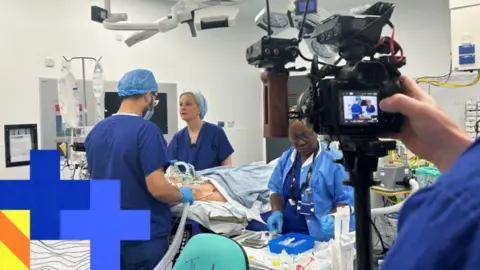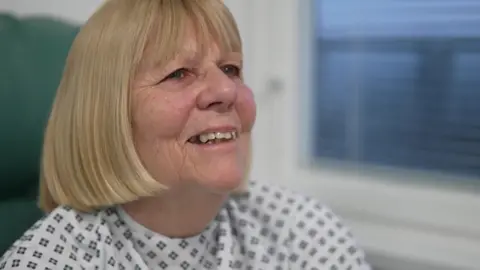BBC News
 BBC News
BBC NewsThe British Broadcasting Corporation is reporting live from the Royal Free Hospital in London to clarify the pressures facing the health service this winter.
By 10 am, the A & E unit was full, and within hours, the hospital had to announce that it had reached the fourth level, indicating the Central NHS leadership was under great pressure.
Some patients had to be treated in the corridors, and patients who needed to be accepted were sent to wait outside the wings on vehicles and chairs to liberate an area in the A & E.
Employees told the BBC that they were about to deal – although they had never had to take the final step of converting ambulances to nearby hospitals.
This, though, is not unusual. Hospitals are up and down in the country and found themselves in this position regularly this winter.
But besides the crowded A & E unit, there were many other stories that you tell. A look at what we learned from the day on the front line.
This is what one day tells us at the London Hospital about NHS.
Employees feel that he is working against them
Weak advisor, Dr. Martin Glaser, takes care of a 32 -bed wing.
It was crowded when the BBC visited – it was not one empty bed. But he said that nearly half of the patients do not need to be there.
“Patients outside the home can be either at home, or at home carefully if the services they need are available.
“It makes us really frustrate. We are doing our best in a system that often feels that it fails and works against us.
“It is not fair for people who want to be at home and they will be better – hospitals are great places to be when you are sick, when you are not sick they are very terrible.”
This, of course, is not unique for Royal Free. Through NHS, patients of every seven beds occupy patients ready to go out – on Thursday, numbers that got the highest level of winter were revealed.
Aging equipment is exacerbated by waiting
Royal Free contains radiotherapy machines to help treat cancer patients. Both are nearly a decade, which is the upper limit for the period to be used.
“We need new machines,” says Claire Hartel, director of radiotherapy.
“Old machines are 50 % less efficient – so with new machines we can treat more people and then wait for less time to treat them in cancer.”
This is a common complaint via NHS.
In England, there is a accumulation of 13.8 billion pounds for buildings and equipment that need to be promoted and replaced. This is what was a decade ago.
Patients in the thirties suffer from heart attacks
As one of eight centers specialized in heart attacks in London, Royal Free get patients from the north of the capital.
Most of the patients who see them in the fifties, sixties and seventies of the last century, but sometimes they will get people in the thirties of the age of the paramedics, says Roy Tenoko nurse.
“It is very horrific to see young people,” he says. “The lifestyle is the big factor in these cases. Many of us work here in the thirties of our last century, so it is worrying to see.”
In the cancer department, employees also highlight how lifestyles cause disease.
About 40 % of cancer is estimated to be associated with diet, alcohol, lack of activity and smoking.
“We are witnessing an increasing number of referrals,” says Gemma Urieli, a bulletproof nurse. “There is a variety of factors – population aging, genetics and frequent cancer, but the way we live is definitely working.”
The accumulation of operations may take 10 years to disinfection
The government has pledged NHS to return to its goal for 18 weeks for routine treatments by the end of this parliament. But the doctors here believe that it will take at least twice.
One of the BBC consultants told the matter that it would take a “decade at least” to clarify it.
This says. Royal Free has increased the number of operations it carried out by 18 % during the past year.
The key to this was the barn theater, which is part of a renewal of 200 million pounds, which was implemented in front of the epidemic.
Up to four operations at the same room can be done in the same room, as senior consultants oversee many patients.
Medical director, Dr. Ash Seni, says he helps the hospital increases productivity.
“We are working hard to try to reduce our waiting lists,” he says. “But it is a slow process.”
Amazing things happen

Margaret Giorgio, 72, went to see her doctor in early December suffering from bloating and jaundice. It was referred to a specialist and pancreatic cancer was diagnosed.
Most cases cannot be dealt with – about 85 % -.
But doctors believe that Margaret’s cancer was arrested early, so she underwent the so -called Whipple action three days ago.
She had half of the pancreas, the yellow canal and gallbladder, along with part of the intestine and stomach.
In the middle of the operation, they had to stop after finding a lesion on her liver – but after a quick examination it was found that it was benign and surgery could continue.
It was an eight -hour complex process. “He was risky,” says her wounds, David Nasala. “But it went as it can.”
She has a long recovery in front of her and she will have to take the medicine every time she eats.
“For a large minority, Whipple procedures can be curative. For this reason we put patients through this complex surgery,” added Mr. Nasala.
